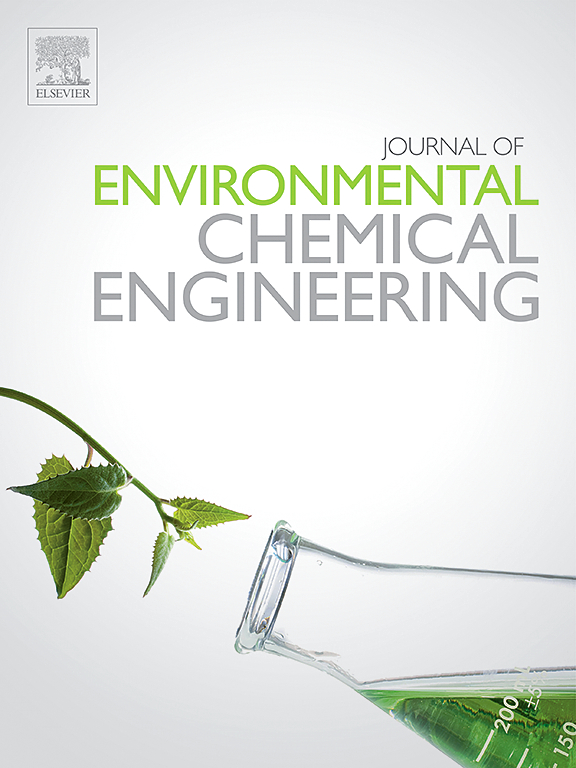Continuous and efficient production of CH4/THF/DIOX composite hydrates for energy dense storage under moderate conditions
IF 7.4
2区 工程技术
Q1 ENGINEERING, CHEMICAL
引用次数: 0
Abstract
Hydrates provide a new approach for energy dense storage under moderate conditions, but poor hydration efficiency and the inability to continuously produce hydrates impede their commercialization. In order to address these two issues, a novel strategy was proposed to achieve hydrate continuous and efficient production under moderate conditions, the dual thermodynamic promoter of THF and DIOX was used to improve hydrate production pressure, D-leucine was employed to accelerate hydrate production kinetics, while the integration of hydrate generation, separation and storage was achieved using a spiral-agitated reactor. Exceptional hydrate production efficiency, conveying efficiency and storage efficiency were obtained, 90 % hydrate production can be completed within 19.21 min, the storage tank can be fully filled within 10 min, and methane apparent storage capacity in the storage tank is up to 79.21 V/V at 3.8 MPa, the energy storage density increases 87.08 % comparing with compressed methane. Raman spectroscopy was used to evaluate hydrate structures, and it is evident that a composite hydrate of CH4/THF/DIOX was formed. The proposed strategy simplifies hydrate production process, causing it to be more energy-efficient, and the average energy consumption for producing one mole hydrates is only 0.00973 kW·h.
在中等条件下连续高效生产CH4/THF/DIOX复合水合物用于能量密集储存
水合物为中等条件下的能量密集储存提供了新途径,但水化效率低和无法连续生成水合物阻碍了水合物的商业化。为了解决这两个问题,提出了在中等条件下实现水合物连续高效生产的新策略:利用THF和DIOX的双热力学促进剂提高水合物生产压力,利用D-leucine加速水合物生产动力学,利用螺旋搅拌反应器实现水合物生成、分离和储存的一体化。获得了优异的水合物生产效率、输送效率和储存效率,在19.21 min内可完成90 %的水合物生产,储罐可在10 min内充满,在3.8 MPa下,储罐甲烷表观储容量达到79.21 V/V,储能密度比压缩甲烷提高87.08 %。利用拉曼光谱对水合物结构进行了表征,发现形成了CH4/THF/DIOX的复合水合物。该策略简化了水合物的生产过程,使其更加节能,生产一摩尔水合物的平均能耗仅为0.00973 kW·h。
本文章由计算机程序翻译,如有差异,请以英文原文为准。
求助全文
约1分钟内获得全文
求助全文
来源期刊

Journal of Environmental Chemical Engineering
Environmental Science-Pollution
CiteScore
11.40
自引率
6.50%
发文量
2017
审稿时长
27 days
期刊介绍:
The Journal of Environmental Chemical Engineering (JECE) serves as a platform for the dissemination of original and innovative research focusing on the advancement of environmentally-friendly, sustainable technologies. JECE emphasizes the transition towards a carbon-neutral circular economy and a self-sufficient bio-based economy. Topics covered include soil, water, wastewater, and air decontamination; pollution monitoring, prevention, and control; advanced analytics, sensors, impact and risk assessment methodologies in environmental chemical engineering; resource recovery (water, nutrients, materials, energy); industrial ecology; valorization of waste streams; waste management (including e-waste); climate-water-energy-food nexus; novel materials for environmental, chemical, and energy applications; sustainability and environmental safety; water digitalization, water data science, and machine learning; process integration and intensification; recent developments in green chemistry for synthesis, catalysis, and energy; and original research on contaminants of emerging concern, persistent chemicals, and priority substances, including microplastics, nanoplastics, nanomaterials, micropollutants, antimicrobial resistance genes, and emerging pathogens (viruses, bacteria, parasites) of environmental significance.
 求助内容:
求助内容: 应助结果提醒方式:
应助结果提醒方式:


